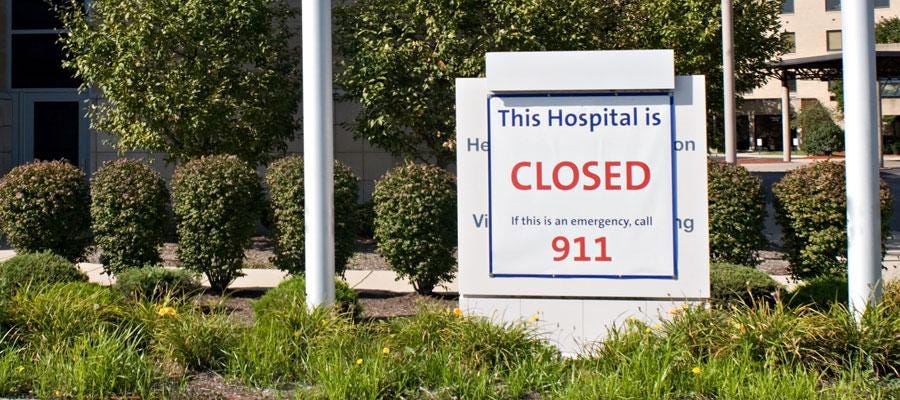The Sad State of Rural Healthcare
When I wrote The Rich Flee and the Poor Take the Bus I spent a lot of time reading outside of major publications like the New York Times or the Chicago Tribune. In doing so, I discovered amazing journalists telling fascinating stories that deserved national attention but never quite made it beyond local or regional notice. Many of these stories stuck with me in a way that major national stories didn’t. They were deep and developed and told tales of struggling communities and the people within them amidst pandemic turmoil. They were filled with people from small local towns similar to where I grew up in rural northern Michigan.
Some of these people, like Marco Antonio Galvan Gomez, appear in my book. Each year, for eight years, he migrated from Mexico to a tiny Texas town named Dalhart in order to harvest potatoes and earn money to feed and house his family back home. When he was infected early in the Covid-19 pandemic his H-2A temporary worker visa did him little good when he required healthcare that his employer did not provide. He was moved from his bunkhouse that he shared with other H-2A workers to a tiny trailer used to isolate ill farmworkers. When he was essentially abandoned by his employer, his only source of hope came from the generosity of co-workers who provided him with over-the-counter medicine and food. Yet, despite this goodwill, the end of his story was not the stuff of fairy tales. He died from his infection, and perhaps from a lack of medical care. (I encourage you to read the full story about Mr. Galvan linked above.)
I read another story lacking a happy ending recently. It was another story about people in a small town, Belzoni, Mississippi, and the struggle to attain health care that is familiar for too many, particularly in rural America. Like too many rural locations recently, Belzoni lost its hospital and since 2013 its residents need to travel 25 miles to seek hospital care.
The Belzoni hospital closure has both complicated causes and effects. In a way, the story seems the inverse of a spider’s web. Many strands were connected, but, unlike the web, there was no support for any of them and the whole structure came crashing down.
A hospital closure in a small community causes a loss of health care access, in particular for urgent needs like cardiac events and accidents. Further, the hospital closure takes jobs with it. The next time you walk into a hospital take note of the myriad workers. It takes far more than physicians and nurses to run a hospital. It needs therapists, social workers, cafeteria staff, custodians, cleaning crews, clerks, accountants, administrators, etc. All of these workers need services, housing and schools to live in the town. When the hospital closes all of these jobs are gone. These job losses cause the entire economy to suffer along with the local schools. In areas like Belzoni, with already dire economic circumstances, the economic effects can be catastrophic. Mom and pop shops and restaurants lose revenues and as they do more people lose their jobs. Rates of employer provided insurance decrease. This is even more problematic in a state like Mississippi that is one of only ten in the country that refuses to expand Medicaid under the Affordable Care Act. In this refusal, they throw away federal funding that could provide healthcare to many currently uninsured people and allow others a more affordable health insurance option. With one of the highest uninsured rates in the state, expanding Medicaid would provide health insurance for about 9% of residents in the county where Belzoni is located and cut their uninsured rate in half. Despite majority support from residents for Medicaid expansion and evidence from other states that doing so provides a net financial benefit, the governor refuses to support it for political reasons.
Many towns like Belzoni keep their hospital together as best they can by lowering the quality of services or decreasing the available forms of care. Others, like Belzoni, simply lose their entire hospital when cuts like these are not enough.
It is communities with characteristics like Belzoni that struggled the most at the height of the pandemic. Dalhart, Texas where Marco Antonio Galvan Gomez farmed potatoes, is another one of these towns. While Dalhart was able to maintain their hospital, it was overrun at the height of the pandemic, in part because of staff shortages due to illness and wave upon wave of cases, hospitalizations and death. What happens when this small hospital must turn patients away? The same thing that happened in Belzoni. Patients are transported elsewhere. Sometimes other nearby hospitals reach capacity too. Still others had already closed prior to the pandemic. The result - patients needing care must travel sometimes hundreds of miles away.
This is the sad state of rural healthcare in too much of the US. We seem to treat healthcare, particularly rural healthcare, as a luxury that only those with large pocketbooks or fancy jobs can afford. We need to do better. We need to recognize healthcare as basic right like education and clean water. Mr. Galvan deserved this as he helped to provide food for a nation. So do the people of Belzoni and other towns like them.
Troy Tassier is a professor of economics at Fordham University and the author of The Rich Flee and the Poor Take the Bus: How Our Unequal Society Fails Us during Outbreaks.


